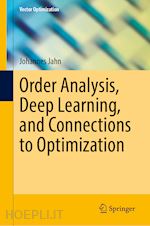
Questo prodotto usufruisce delle SPEDIZIONI GRATIS
selezionando l'opzione Corriere Veloce in fase di ordine.
Pagabile anche con Carta della cultura giovani e del merito, 18App Bonus Cultura e Carta del Docente
This book introduces readers to order analysis and various aspects of deep learning, and describes important connections to optimization, such as nonlinear optimization as well as vector and set optimization. Besides a review of the essentials, this book consists of two main parts.
The first main part focuses on the introduction of order analysis as an application-driven theory, which allows to treat order structures with an analytical approach. Applications of order analysis to nonlinear optimization, as well as vector and set optimization with fixed and variable order structures, are discussed in detail. This means there are close ties to finance, operations research, and multicriteria decision making.
Deep learning is the subject of the second main part of this book. In addition to the usual basics, the focus is on gradient methods, which are investigated in the context of complex models with a large number of parameters. And a new fast variant of a gradient method is presented in this part. Finally, the deep learning approach is extended to data sets given by set-valued data. Although this set-valued approach is more computationally intensive, it has the advantage of producing more robust predictions.
This book is primarily intended for researchers in the fields of optimization, order theory, or artificial intelligence (AI), but it will also benefit graduate students with a general interest in these fields. The book assumes that readers have a basic understanding of functional analysis or at least basic analysis. By unifying and streamlining existing approaches, this work will also appeal to professionals seeking a comprehensive and straightforward perspective on AI or order theory approaches.
Preliminaries.- C Representing Functionals.- Application in Nonlinear Optimization.- Application in Vector Optimization.- Application in Set Optimization.- Basics of Deep Learning.- Deep Learning with Set-Valued Inputs.
Johannes Jahn is a retired university professor at the Department of Mathematics of the Friedrich-Alexander-University Erlangen-Nürnberg (Germany). His research interests are theory and numerical methods in nonlinear optimization, vector optimization and set optimization. Johannes Jahn is the editor of the book series on "Vector Optimization" published with Springer.











Il sito utilizza cookie ed altri strumenti di tracciamento che raccolgono informazioni dal dispositivo dell’utente. Oltre ai cookie tecnici ed analitici aggregati, strettamente necessari per il funzionamento di questo sito web, previo consenso dell’utente possono essere installati cookie di profilazione e marketing e cookie dei social media. Cliccando su “Accetto tutti i cookie” saranno attivate tutte le categorie di cookie. Per accettare solo deterninate categorie di cookie, cliccare invece su “Impostazioni cookie”. Chiudendo il banner o continuando a navigare saranno installati solo cookie tecnici. Per maggiori dettagli, consultare la Cookie Policy.